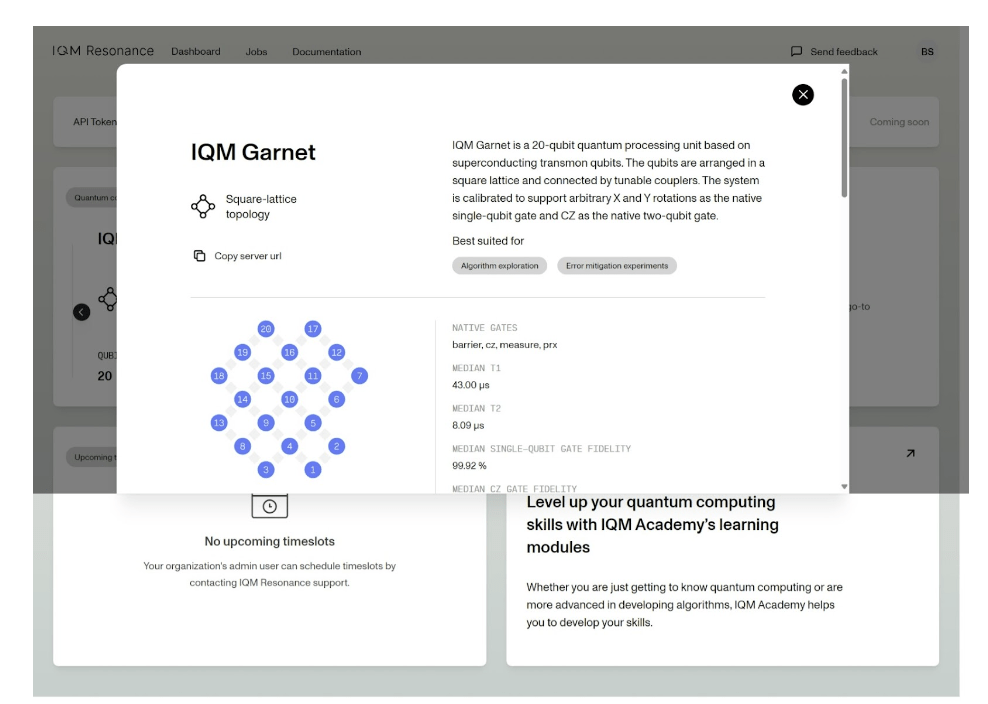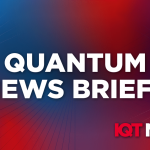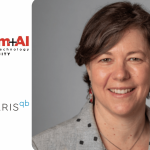Resonating with IQM Resonance-By Brian Siegelwax

Are you waiting in queues that last hours, days, or even longer to use a quantum computer? Are premium options such as allocations, reservations, and sessions coming up short? Are your monthly budgets straining as you try to complete jobs in a timely fashion?
I just ran so many jobs in so little time I needed to take a nap. True story.
IQM Resonance is IQM’s cloud quantum computing service. It currently offers IQM Garnet, a 20-qubit superconducting quantum computer, and IQM Deneb, a 6-qubit all-to-all-connected superconducting quantum computer. Details of the technical differences can be found here.
IQM Resonance is our new cloud service, dedicated to accelerating your quantum computing exploration, research and innovation. Whether you are coming from academia or enterprise, you will have a fully managed service environment with our latest QPUs and hardware not available anywhere else.
One-hour free trials are available, and I tried to take the fullest possible advantage of one. For your consideration: The Good, The Bad, and The Ugly of IQM Resonance.
The Good
True reservations. Dedicated access for one hour means dedicated access for one hour. Without preparing any code in advance, I ran 35 jobs during my trial, including batch jobs (multiple quantum circuits). If you’ve never had a multi-million dollar/euro quantum computer all to yourself, it’s glorious.
Weekly timesharing. IQM’s paradigm grants one hour of dedicated access weekly. This is a much better paradigm than waiting until the 1st of the next month, consuming all of your premium access almost immediately, and then waiting until the 1st of the following month again before you can realistically accomplish anything.
Cost comparison. I’m not at liberty to publish the pricing, but I suspect many organizations can save money by switching to IQM.
Dashboard. Everything I needed to find was easy to find: the API key, hardware specifications, and documentation are intuitively where they should be. Besides ease of navigation, the portal is not cluttered with anything you don’t need.
API key. You can access IQM Resonance from your preferred environment. I used Google Colab and had no environment-related issues.
20,000 shots. The sample code specifies a shot count of 1,000, but you can increase it to 20,000. I’ve historically found this limit to be sufficient.
Fast. I clocked submission-to-retrieval times from 15.9 seconds (Bell state) to 33.3 seconds (20-qubit GHZ). Because of dedicated access, wait times were 0 seconds.
Batch jobs. I didn’t have time to push the limits, but a batch of 20 Bell states completed in 3 minutes and 16 seconds. There was insufficient time to troubleshoot errors with 100 Bell states and 20 20-qubit GHZ states, but small batch jobs are definitely supported. To be fair to IQM, I didn’t even see it in the documentation; I just tried it to see if it would work. It does.
Coherence. The top two results for inefficiently-constructed GHZ states – qubit 0 entangled with all others – were correct up to 15 qubits without measurement error mitigation. A few short years ago it was impossible to go up to 5 on available hardware, so 15 is better than I expected.
The Bad
IQM Deneb. After seeing the demo, I wished I had asked to use IQM Deneb. That’s not a criticism of IQM Garnet, but I haven’t seen anything like IQM Deneb before. So, “The Bad” is that I’ve only played with one IQM backend thus far.
Error Mitigation. “The Bad” is that there was insufficient time to try it. It would be interesting to see how much further IQM Garnet can be pushed.
Batch circuits. All the circuits in each batch have to measure the same qubits. That may not be a constraint on every job, but I obviously discovered the limitation by submitting differently-sized, differently-measured circuits.
Login. Troubleshooting was required initially. They made up for the time so I still got in a full evaluation, but I would be remiss if I omitted this. I’ve been told that the cause has been identified and resolved, so it hopefully shouldn’t affect anyone else.
Sample code. There is enough sample code to build and run circuits, but it also required troubleshooting initially. After the hiccup, though, it was smooth sailing. The resolution for this one should also hopefully prevent this issue from affecting anyone else.
Coherence. By five qubits the GHZ measurements were already noticeably skewed toward zeroes. Again, that’s without optimizing the circuit for IQM Garnet’s topology. And, again, I pushed it to 15 qubits. And, again, that’s without error mitigation. But without circuit optimization, you may find yourself reaching the relaxation limits of the qubits.
Birthstones. It could’ve been called IQM Amethyst, but I digress….
The Ugly
Dependency. The problem with software being dependent on other software is that the dependency’s issues can become the dependent software’s issues. There is the potential for dependency-related issues to arise that could force you to update your code at no fault of IQM other than having included the dependency.
Conclusion-Resonance Helps Computing Research
IQM Resonance is a legitimate option for quantum computing research. I knew this going into my trial, due to the recent concerts that played music composed with one of the IQM quantum computers, but hands-on confirmation is always preferred. The concerts were able to retrieve measurement results in near real-time and render the new compositions alongside human performances. In contrast, I was focused simply on determining the limits of IQM Garnet, which is so much easier when jobs complete in a timely fashion.
























